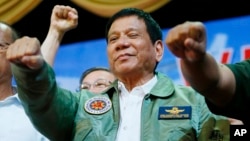Political analysts and commentators in the Philippines say President Rodrigo Duterte is steering the country’s foreign policy towards a more nationalist narrative, marking a shift from recent Philippine leaders.
Further evidence of Duterte's approach came in an address to civil servants Monday as the president called for U.S. military advisers to be withdrawn from Southern Mindanao where Philippine troops have been battling Muslim insurgents. U.S. special forces have been in the region to help with countererrorism operations since 2002.
Duterte said as “long as we stay with America, we will never have peace in [Mindanao]. We might as well give up.”
He said he has long wanted to review foreign policy, but he could not because he “did not want a rift with America. But they have to go,” he said, warning if Americans are seen in the region they will be taken hostage or killed.
During the speech, Duterte held aloft photos and accounts of U.S. troops who in 1906 were accused of atrocities against Muslims during a rebellion against American rule.
At the summit of Asian leaders last week in Laos, Duterte also referred to the killings during the colonial period, veering off his prepared speech focused on the South China Sea. A scheduled meeting between U.S. President Barack Obama and Duerte at the ASEAN summit was canceled after Duterte referred to Obama as a "son of a bitch."
The Duterte administration has sought to ease tensions with China through talks over the conflicted South China Sea. Previous Philippine president Benigno Aquino’s administration had taken the dispute to international arbitration at The Hague.
Military Agreement
The Philippines and the United States have been strengthening military ties in recent years as regional tensions grew over the South China Sea.
In 2014, the two countries signed a new 10-year military agreement. And in March, prior to Duterte’s election, the United States and the Philippines signed a pact clearing the way for a new permanent U.S. military presence, including a base in Mindanao, the center of the long running Muslim insurgency.
The United States also joined other countries and the United Nations in criticizing Duterte's war on drugs policy that has left hundreds dead in extrajudicial killing.
Carl Thayer, a defense analyst with the University of New South Wales, says U.S. Special Forces in the southern Philippines have been providing intelligence and some tactical training to the Philippine military, but had been low key.
“The U.S. might be concerned that terrorism could revive, but there’s very little you could do, and when the president asks you to go, you’ve got to, because the U.S. has no other choice. It would threaten the whole position in the Philippines,” Thayer said.
So far there are no signs that Duterte is interested in scuttling the broader U.S.-Philippines defense agreement. Philippine Foreign Minister Perfecto Yasay and senior military leaders say Duterte’s comments were not a sign that agreements between the United States and the Philippines would be abrogated.
On Monday, a U.S. State Department spokesman said he had seen news reports of Duterte's comments, but had received no official request to withdraw American forces from the counterterror operations.
Meanwhile, U.S. officials say Washington remains committed to its long standing alliance with the Philippines, including the fight against terrorist organizations.
But several Philippine-based commentators welcomed the “shift away from dependence and subservience to America,” according to The Manila Times.
“If the Philippines is closely aligned with the United States, it risks being dragged into the intensifying big-power rivalry, with potentially grave dangers for national interests and the Filipino people,” the Times commentary added.
New Direction
Political science professor at the Philippine's University, Dennis Quilala, says Duterte's stance marks a shift from past administrations.
"It's quite different from how the Philippines treated the United States before. What's clear now it that the United States is not the only option for the Philippines. Other interests are going to be considered," Quilala told VOA, without specifying.
Philippine presidential spokesman Ernesto Abella told local media Duterte’s latest comments reflected the government’s new direction towards a more independent foreign policy.
Mark Thompson, director of the Southeast Asia Research Center (SEARC) at City University of Hong Kong, says Duterte is pursuing a “nationalist narrative” not evident in recent Filipino administrations. Thompson says people have long been writing in the Manila papers pressing a nationalist narrative and opposition to the United States.
“This nationalist narrative has always been there. There are a lot of intellectuals and activists in the Philippines that have long believed this and now they have a president finally saying it,” Thompson said.
“Also [Duterte] is not a classical leftist, he’s not a communist, not even a classically social democrat really, but he uses this nationalist narrative,” he said.




